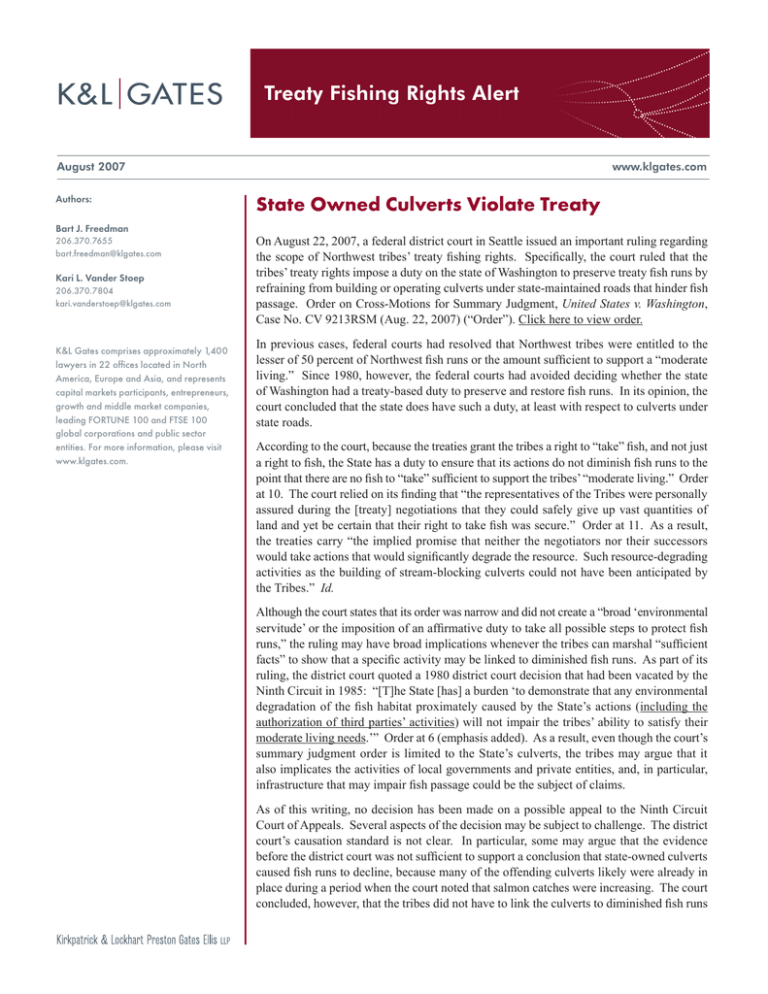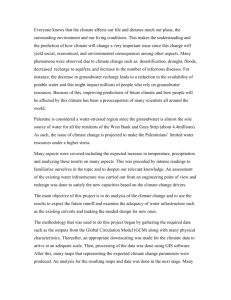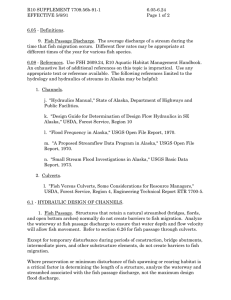
Treaty Fishing Rights Alert
August 2007
Authors:
Bart J. Freedman
206.370.7655
bart.freedman@klgates.com
Kari L. Vander Stoep
206.370.7804
kari.vanderstoep@klgates.com
K&L Gates comprises approximately 1,400
lawyers in 22 offices located in North
America, Europe and Asia, and represents
capital markets participants, entrepreneurs,
growth and middle market companies,
leading FORTUNE 100 and FTSE 100
global corporations and public sector
entities. For more information, please visit
www.klgates.com.
www.klgates.com
State Owned Culverts Violate Treaty
On August 22, 2007, a federal district court in Seattle issued an important ruling regarding
the scope of Northwest tribes’ treaty fishing rights. Specifically, the court ruled that the
tribes’ treaty rights impose a duty on the state of Washington to preserve treaty fish runs by
refraining from building or operating culverts under state-maintained roads that hinder fish
passage. Order on Cross-Motions for Summary Judgment, United States v. Washington,
Case No. CV 9213RSM (Aug. 22, 2007) (“Order”). Click here to view order.
In previous cases, federal courts had resolved that Northwest tribes were entitled to the
lesser of 50 percent of Northwest fish runs or the amount sufficient to support a “moderate
living.” Since 1980, however, the federal courts had avoided deciding whether the state
of Washington had a treaty-based duty to preserve and restore fish runs. In its opinion, the
court concluded that the state does have such a duty, at least with respect to culverts under
state roads.
According to the court, because the treaties grant the tribes a right to “take” fish, and not just
a right to fish, the State has a duty to ensure that its actions do not diminish fish runs to the
point that there are no fish to “take” sufficient to support the tribes’ “moderate living.” Order
at 10. The court relied on its finding that “the representatives of the Tribes were personally
assured during the [treaty] negotiations that they could safely give up vast quantities of
land and yet be certain that their right to take fish was secure.” Order at 11. As a result,
the treaties carry “the implied promise that neither the negotiators nor their successors
would take actions that would significantly degrade the resource. Such resource-degrading
activities as the building of stream-blocking culverts could not have been anticipated by
the Tribes.” Id.
Although the court states that its order was narrow and did not create a “broad ‘environmental
servitude’ or the imposition of an affirmative duty to take all possible steps to protect fish
runs,” the ruling may have broad implications whenever the tribes can marshal “sufficient
facts” to show that a specific activity may be linked to diminished fish runs. As part of its
ruling, the district court quoted a 1980 district court decision that had been vacated by the
Ninth Circuit in 1985: “[T]he State [has] a burden ‘to demonstrate that any environmental
degradation of the fish habitat proximately caused by the State’s actions (including the
authorization of third parties’ activities) will not impair the tribes’ ability to satisfy their
moderate living needs.’” Order at 6 (emphasis added). As a result, even though the court’s
summary judgment order is limited to the State’s culverts, the tribes may argue that it
also implicates the activities of local governments and private entities, and, in particular,
infrastructure that may impair fish passage could be the subject of claims.
As of this writing, no decision has been made on a possible appeal to the Ninth Circuit
Court of Appeals. Several aspects of the decision may be subject to challenge. The district
court’s causation standard is not clear. In particular, some may argue that the evidence
before the district court was not sufficient to support a conclusion that state-owned culverts
caused fish runs to decline, because many of the offending culverts likely were already in
place during a period when the court noted that salmon catches were increasing. The court
concluded, however, that the tribes did not have to link the culverts to diminished fish runs
Treaty Fishing Rights Alert
from 1986 to 1999 to obtain a court order imposing
a treaty duty on the State to repair and retrofit its
culverts:
The State argues that the Tribes have produced no
evidence that the blocked culverts “affirmatively
diminish[] the number of fish available for harvest”.
. . The Tribes’ showing that fish harvests have been
substantially diminished, together with the logical
inference that a significant portion of this diminishment
is due to the blocked culverts which cut off access
to spawning grounds and rearing areas, is sufficient
to support a declaration regarding the culverts’
impairment of treaty rights.
Order at 5, 8. This aspect of the court’s order is cause
for concern, because if it is interpreted broadly, it
could permit the tribes to identify any activity or
existing infrastructure that potentially impairs fish runs
and demand removal or retrofit without specifically
demonstrating that the activity or infrastructure is
responsible for diminished fish harvest.
An appeal of the court’s ruling could also target the
court’s adoption of the “moderate living” standard as
the measure of the duty the State and others have to
change activities or retrofit infrastructure that degrade
fish runs. Prior decisions of the Ninth Circuit have
indicated that the court may prefer a “reasonableness”
test under which all parties must take “reasonable steps
commensurate with the resources and abilities of each
to preserve and enhance the fishery.”
The court’s summary judgment order eliminates the
need for a trial on the merits, which was scheduled
to begin on September 24, 2007. However, further
district court proceedings will be necessary to develop
appropriate remedies. The tribes have requested the
following relief: (1) an injunction prohibiting the State
from constructing or maintaining any culverts that
block fish passage to the tribes’ usual and accustomed
fishing grounds, (2) an injunction requiring the State
to identify all offending culverts within 18 months,
and (3) an injunction requiring the State to repair and
retrofit any offending culverts within five years. Order
at 3.
This decision has substantial implications for public
and private parties in the state of Washington. Press
reports suggest that there will be an effort by tribes to
apply the decision broadly. If no appeal is taken, the
result could be considerable uncertainty by regulators
as to how the decision should be interpreted.
K&L Gates comprises multiple affiliated partnerships: a limited liability partnership with the full name Kirkpatrick & Lockhart Preston Gates Ellis LLP qualified in
Delaware and maintaining offices throughout the U.S., in Berlin, and in Beijing (Kirkpatrick & Lockhart Preston Gates Ellis LLP Beijing Representative Office); a
limited liability partnership (also named Kirkpatrick & Lockhart Preston Gates Ellis LLP) incorporated in England and maintaining our London office; a Taiwan
general partnership (Kirkpatrick & Lockhart Preston Gates Ellis) which practices from our Taipei office; and a Hong Kong general partnership (Kirkpatrick &
Lockhart Preston Gates Ellis, Solicitors) which practices from our Hong Kong office. K&L Gates maintains appropriate registrations in the jurisdictions in which
its offices are located. A list of the partners in each entity is available for inspection at any K&L Gates office.
This publication/newsletter is for informational purposes and does not contain or convey legal advice. The information herein should not be used or relied
upon in regard to any particular facts or circumstances without first consulting a lawyer.
Data Protection Act 1998—We may contact you from time to time with information on Kirkpatrick & Lockhart Preston Gates Ellis LLP seminars and with our
regular newsletters, which may be of interest to you. We will not provide your details to any third parties. Please e-mail london@klgates.com if you would prefer
not to receive this information.
©1996-2007 Kirkpatrick & Lockhart Preston Gates Ellis LLP. All Rights Reserved.
August 2007 |





